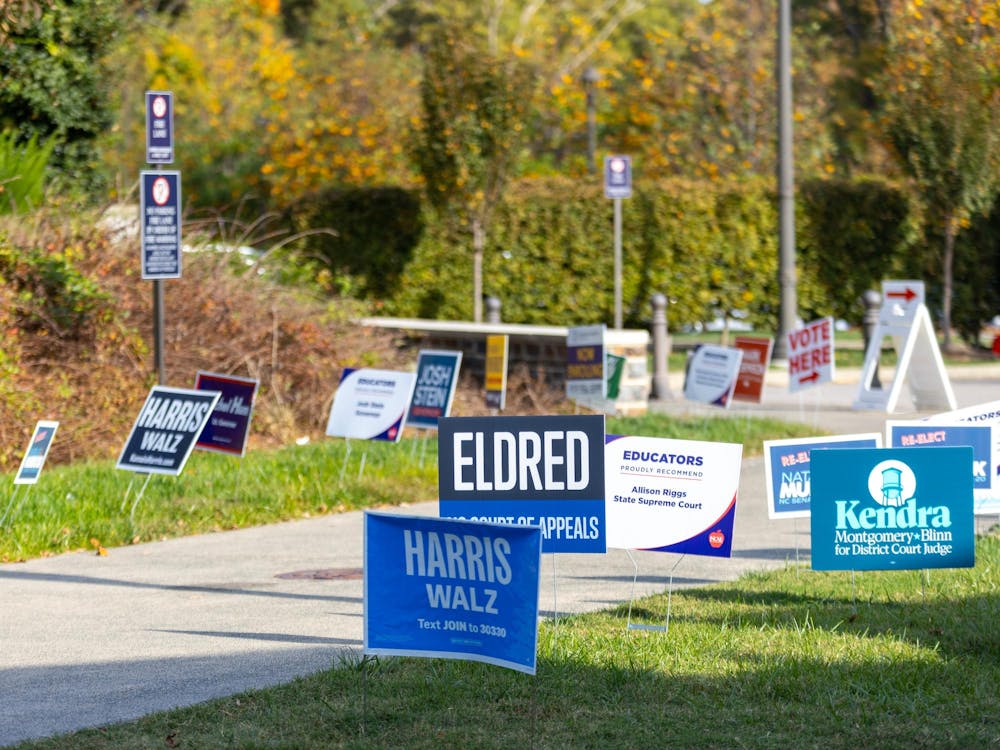Starting Oct. 17, the Karsh Alumni and Visitors Center transformed into an early voting poll site for Durham residents — including many Duke community members — for the 2024 general election.
North Carolina’s early voting period began Oct. 17 and ended this Saturday. In that time, a record 4,465,548 North Carolinians cast their ballots in the state, breaking the previous record of 3.63 million early voters in 2020.
Karsh accounted for 13,956 of those votes, ranking sixth out of Durham County’s 12 early voting locations.
Federal and state-level races are on the ballot this election cycle, and in North Carolina, both the presidential and gubernatorial races have been highly monitored.
As the campaigns focus their attention on Election Day, The Chronicle spoke to early voters at Karsh Oct. 24 and 25 to get a sense of what is bringing people to the polls this year.
First-year Lawson President said he was “inspired to vote” for Harris after attending Minnesota Gov. Tim Walz’s Oct. 24 rally on campus, adding that he felt it was his “duty” to vote for “somebody [he] believe[s] in — who believes in us.”
Anna Perez, a sophomore, also said she was reminded to vote by the Walz rally. She identified abortion protections and the Israel-Hamas war as major issues that influenced her decision to back certain candidates.
Most voters interviewed stated that reproductive rights were their primary motivator to vote.
This will be the first federal election in North Carolina since the Republican supermajority in the state legislature banned abortion after 12 weeks in 2023, following the overturning of Roe v. Wade.
“I couldn't imagine somebody telling me what I can and can't do with my body, so that’s number one,” said Hillsborough resident Carla Martinez.
Most voters who said that reproductive rights were their primary issue shared that they voted for Harris and down-ballot Democrats.
Mary Peavey, Trinity ‘05 and House Staff ‘10-13, is an IVF physician who prioritizes “reproductive health and justice.” As a result, she voted for all Democratic candidates on the ballot.
The economy, education and democracy were also cited by voters as important issues.
“Getting rid of the Department of Education is kind of not something that I'm looking for in a president,” said junior Connor Burrill, referring to Trump’s campaign trail comments stating his plans to eliminate the federal office.
When asked about other races, students and residents interviewed had less knowledge of candidates further down the ballot.
While he is not originally from North Carolina and was less informed about municipal elections, President expressed his view that it is still important to vote in down-ballot races.
“I'm from Maryland, but making sure that Durham is doing great is something that is my duty as well,” he said.
On the other hand, there were some down-ballot races that stood out to voters.
Durham resident Karen McPhaul noted in particular the race for superintendent of public instruction, where she indicated her support for Democratic nominee Mo Green, Trinity ‘88 and Law School ‘91. McPhaul did not vote for all Democratic candidates, noting that she was “a little mixed on” some state-level offices.
Interviewees stated their primary reason for casting ballots during the early voting period was out of convenience.
Get The Chronicle straight to your inbox
Sign up for our weekly newsletter. Cancel at any time.
“It's one of those things where, if I get it out of the way now, I'll make sure that I get it done,” said graduate student Sydney Velotta.
Similarly, Perez shared that her main impetus for voting early was concern over long lines on Election Day. She added that attending with her friends also made the experience “fun.”
For those who do not vote during the early voting period at Karsh, students registered in North Carolina can vote at their designated polling location on Election Day, which will be off-campus.
Dylan Halper is a Trinity first-year and a staff reporter for the news department.

